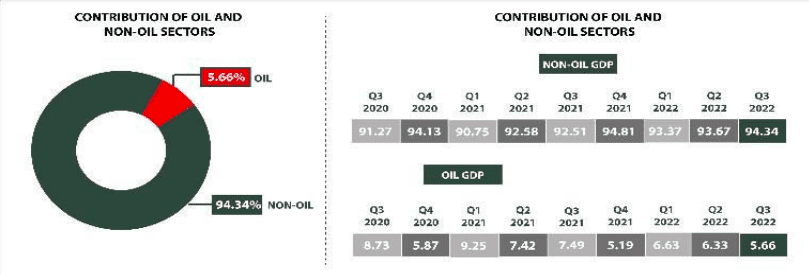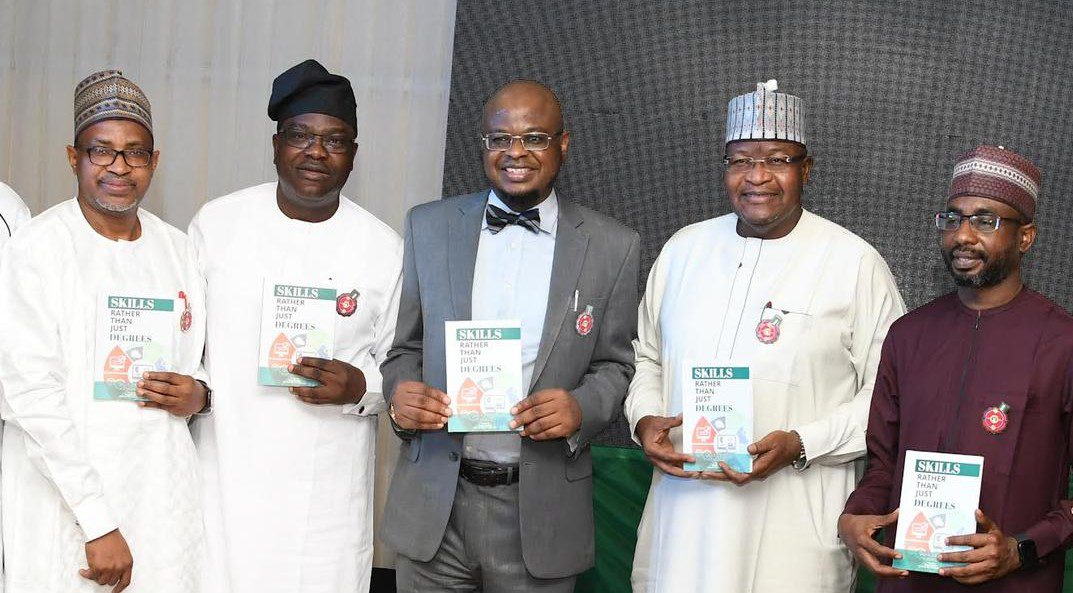Last week, the National Bureau of Statistics (NBS) released Nigeria’s real Gross Domestic Product (GDP) report for the third quarter of the year, and Information and Communications Technology (ICT) is one of the sectors that had a good run in the quarter under review.
According to the report, the ICT sector contributed 15.35% to the country’s GDP in Q3 2022. This is, however, a significant drop from the 18.44% recorded in Q2 2022.
But compared to the figure reported in the third quarter of the previous year, Q3 2022 witnessed some growth in terms of the contribution of the ICT sector — from 14.20% to 15.35%.
In case you are unfamiliar with the full scope of the sector, ICT comprises the four activities of telecommunications and information services; publishing; motion picture, sound recording, and music production; and broadcasting.


In nominal terms, in Q3 2022, the sector growth was recorded at 20.32% (year-on-year), a 9.15% points increase from the rate of 11.17% recorded in the same quarter of 2021 and 6.20% points higher than the rate recorded in the preceding quarter. The quarter-on-quarter growth rate recorded in the third quarter of 2022 was -8.25%.
The report added that the ICT sector contributed 9.58% to the total nominal GDP in the 2022 third quarter, higher than the rate of 9.22% recorded in the same quarter of 2021 and lower than the 12.12% it contributed in the preceding quarter.
Altogether, Nigeria’s GDP grew by 2.25% year-on-year in real terms in Q3 2022, a 4.03% decline in growth rate compared to the third quarter of 2021. “The reduction in growth is attributable to the base effects of the recession and the challenging economic conditions that have impeded productive activities,” the report said.


While the oil sector contributed 5.66% to the total real GDP in the quarter under review, the non-oil sector contributed 94.34%, driven mainly by activities in ICT (telecommunication); trade; transportation (road transport); financial and insurance (financial institutions); agriculture (crop production) and real estate.
Read also: ICT sector contributed 16% to Nigeria’s GDP in Q1 2022- NBS
Telecoms remains the boss
The exciting growth rate of the ICT sector is primarily due to the telecommunications sub-sector, which singularly contributed 12.85% to the GDP in the actual term. Trailing behind telecoms in the ICT sector in terms of contribution is the broadcasting sub-sector, with 1.38%.
That the telecoms space is leading the growth of leading Nigeria’s GDP is hardly surprising. The industry has recorded significant growth in recent years due to the country’s very young and rapidly increasing urban population and the ever-increasing adoption of smartphones, services, and apps.
For instance, broadband penetration in Nigeria reached 44.5% in July. According to The Mobile Economy Sub-Saharan Africa 2022 report published by GSMA, Nigeria gain 18 million new mobile subscribers by 2025.


Per recent data from the Nigerian Communications Commission (NCC), the number of active telecommunications subscribers services in the country hit over 212 million in September, just as internet penetration in terms of subscribers grew to more than 152 million. In the same month, MTN — which controls 38.33% market share — rolled out the fifth-generation (5G) mobile network in Nigeria.
On the surface, things appear to be going well for the Nigerian telecoms space. However, there are still challenges, particularly the dominance of the more prominent operators, which, according to Ayoola Oke, a telecoms lawyer, “are suffocating the industry”.
Government regulation is, of course, another major issue. Telcos lost over 15.5 million customers between December 2020 and March 2021 due to the SIM registration ban occasioned by the NIN-SIM linkage policy. Just recently, the Federal Government was forced to reverse a controversial 5% excise duty it imposed on telecommunication services.
Related article: Africa’s mobile economy is headed towards boom in the next three years.
Why ICT is growing in Nigeria
“For over 10 years, ICT has consistently contributed more than 10 percent of Nigeria’s Gross Domestic Product (GDP) – the telecom sector alone contributed 12.45 percent to GDP as of the fourth quarter of 2020,” the Executive Vice Chairman of NCC, Prof. Umar Danbatta, said in January.
If anything, Nigeria has witnessed phenomenal growth in its ICT sector in recent years, overtaking the oil sector, which used to dominate its GDP bottom line. For context, ICT is contributing more than oil to Nigeria’s GDP.
It gets more interesting when you consider that Nigeria currently accounts for 82 per cent of Africa’s ICT market, which is troubled by access to affordable internet. But ICT prides itself as the fastest-growing sector of the Nigerian economy, owing to the combined efforts of both operators and the government.


Last Thursday, the Federal Government launched a provision of broadband infrastructure for micro, small and medium enterprises (MSME) & tertiary institutions across the country in pursuit of the National Digital Economy Policy and Strategy 2020–2030, said to be the principal policy driving Nigeria’s digital transformation.
Before now, several policies have been introduced for the ICT sector. In March 2020, Nigeria’s Minister for Communication and Digital Economy, Prof. Isa Ali Pantami, officially launched Nigeria’s National Broadband Plan 2020-2025 with a target of achieving 70% penetration by 2025. But, recent data from the NCC show a 5.24% increase in broadband penetration in the two years of implementing the plan.





